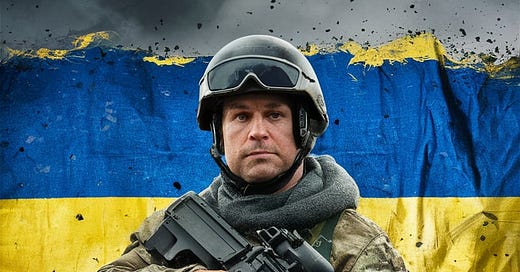Contents: Strategy, Kursk, & Scorched Earth, WOTD
Word of the day last time was "encirclement" word of the day this time is "surrender". Draw your own conclusions about WOTD.
Nukes, Jets, & Chips: How Global Enlightenments Happen
https://www.amazon.com/Nukes-Jets-Chips-Enlightenments-Quizmaster/dp/B0D7MGSVFW
The following books are is still free for about 20 more hours after that it's paywalled again such is amazon. Your book reviews are greatly appreciated they help others to find the books and also help me to improve. Thanks for your feedback, readers are leaders!
Free this week. Just download and review.
Found the insights valuable? Your review can help others benefit too! If you enjoyed the book, please consider leaving a 5-star review. Your feedback makes a big difference! https://www.amazon.com/review/create-review/ref=cm_cr_othr_d_wr_but_top?ie=UTF8&channel=glance-detail&asin=B0D9C5MKQ7
You can also write your review here.
Write your review here please it helps me and other readers to discover the works.
Harris Will Win, Trump Will Lose: Here's Why (Election 2024)
Write a book review of it all the cool kids aren’t
by Eric Engle
Kindly write your book review here it helps get the word out and lets others discover it. https://www.amazon.com/review/create-review/ref=cm_cr_othr_d_wr_but_top?ie=UTF8&channel=glance-detail&asin=B08KWPDCKH
STRATEGIC INSIGHTS AND TACTICAL SILENCE
Since Ukraine obtained U.S. resupply and the success of Ukrainian deep strikes against Russian air and petroleum assets I have been concentrating on the strategic issues of Western relations with China and describing Ukraine's strategy in detail in my book: giving away that strategy earlier was not prudent given the lack of supply and contention over destroying Russia's air force and oil industry. My comments about the Kursk offensive have consequently been private, and largely cautious because of the failure of the Zaporizhia offensive a year ago.
I note with satisfaction the fact the Ukrainian operational security was tighter than a virgin princess captive on a pirate ship. Oh, that ransom!
Hopefully the Americans will learn from their example: they probably will not, thanks to undisciplined, lazy, and naive.
KURSK: BLAB RHYME WITH BLAM.
War is like this: people are trying to kill each other. This means there is secrecy. This also means there is deception. "All war is based on deception" is what Sun Tzu teaches.
Meanwhile, information in war is imperfectly distributed. This is commonly called "the fog of war": uncertainty. I may have little or no tactical knowledge, and even if I did I would want to conceal that.
In Zaporizhiya we saw countless motivated Ukrainians lives wasted in head-on attacks against Russian fortifications with predictable deadly results for the attacker. Unsurprisingly thereafter, Zelenskiy changed commanders. Many opposed the change in commanders, but this was the correct choice given the results in the Zaporizhia and Kursk offensives.
We can observe the Ukrainian forces' leadership, training, motivation are all in good order. We must assume that is also true of the Russians, until proven otherwise! Wishful thinking in war is deadly. Copium is deadly dangerous: presume the worst, plan accordingly, and hope for and seek after the best outcome is the proper attitude toward strategy and tactics alike.
Ukraine's strategic goal is clear: to foment rebellion, mutiny, insurrection, sabotage, purges, and a coup in the "Russian" Federation. That will not change regardless of the outcome in Kursk oblast.
Those who expect or hope for the offensive in the Kursk oblast to drive on to Moscow are unrealistic at best, setting up Ukraine for defeat at worst. To drive on to Moscow would require supplies, and no real resistance or even cooperation by the Russians. That we cannot expect and ought not plan on. Putin's goal might well be to lure the Ukrainians deep into Russia, then to counterattack and cut off their supplies, encircling and destroying them. This is exactly the strategy Russia succesfully used against the Swedes in the Great Northern War, against the French in 1812, and against Germany in 1941.
Ukraine's tactical goals are to capture as many prisoners as possible, to kill those "Russians" who foolishly refuse to surrender, to seize or destroy as many Russian weapons, munitions, and fuel as possible. The Kursk offensive could not realistically drive on to Moscow. A drive on Moscow would require supplies and Ukraine may lack them. A drive on Moscow would also require a supply train, that is, vehicles with fuel, food, and munitions. Such a supply train would be inevitably vulnerable to Russian raids, partisans, and saboteurs. The closer the Ukrainians are to Moscow the greater will be the Russian resistance. Russia/Putin has no plan to lose the war and win the peace by letting Ukraine conquer Russia and attaining a unified Russo-Ukrainian state thereby. Russia's defensive strategy has always been scorched earth: to lure the enemy deeper into Russia, destroying all possible infrastructure and goods that the invading army might use. Then, when the invader has outrun their own supply lines, counterattack to cut off the invader's supply lines and encircle the invaders. It worked against Sweden, France, and Germany, and would very likely work against Ukraine too.
Hopefully Ukraine will not get "victory fever" and be lured into a deep unsustainable attack.
Ukraine's strategy is to foster revolution, rebellion, mutiny, and coup in Moscow. It's tactics are defensive warfare and raids and strikes inside Russian territory, usually by saboteurs, rockets, and drones: we should see the Kursk raid as just that.
SCORCHED EARTH STRATEGY IN RUSSIAN HISTORY
Russia’s military strategy, particularly in defensive warfare, has historically revolved around a tried-and-true method: lure the enemy deep into Russian territory, cut off their supply lines, and then annihilate them through a combination of relentless raids and the brutal effectiveness of a scorched-earth policy.
The initial phase of this strategy involves a calculated retreat, allowing the enemy to advance deeper into Russian territory. This might seem like a concession of ground, but it is, in fact, a deliberate maneuver designed to stretch the invader's supply lines to their breaking point.
As the invading force pushes forward, they become increasingly isolated from their own bases of supply. Russian forces then execute a series of targeted raids on these overextended supply lines, striking at vulnerable convoys carrying essential food, ammunition, and fuel. Without these supplies, the enemy's operational capabilities deteriorate rapidly. The deeper they move into Russian territory, the more difficult and dangerous it becomes for them to maintain their advance.
Central to this strategy is the scorched-earth policy, a ruthless but highly effective tactic. As Russian forces retreat, they systematically destroy anything that could be of use to the enemy. Farms are burned, wells are poisoned, bridges are demolished, and entire towns are razed to the ground. This ensures that the advancing enemy finds nothing to sustain themselves, forcing them to rely entirely on their increasingly tenuous supply lines.
Historical Examples of Scorched Earth
1. The Great Northern War (1700-1721):
During the Great Northern War, Russia faced the formidable Swedish Empire under Charles XII. As the Swedish army advanced into Russian territory, Peter the Great ordered a scorched-earth campaign. Russian forces burned crops and villages, leaving the Swedes to starve in the harsh winter. This strategy culminated in the decisive Battle of Poltava in 1709, where the weakened Swedish army was soundly defeated.
2. Napoleon's Invasion of Russia (1812):
Perhaps the most famous example of Russia’s scorched-earth strategy is Napoleon’s ill-fated invasion of Russia in 1812. As Napoleon’s Grande Armée marched towards Moscow, Russian forces retreated, destroying everything in their path. When Napoleon finally reached Moscow, he found the city abandoned and largely set ablaze by the Russians themselves. With his army starving and winter approaching, Napoleon was forced to retreat, only to be harried and decimated by Russian forces during the long and brutal march back to France. Of the 600,000 soldiers who began the campaign, fewer than 100,000 returned.
3. Operation Barbarossa (1941):
During World War II, Nazi Germany launched Operation Barbarossa, the largest invasion in history, targeting the Soviet Union. As the Germans advanced, Soviet forces implemented a scorched-earth policy, destroying infrastructure, burning crops, and evacuating entire populations. The Germans, who had anticipated a quick victory, found themselves bogged down in a war of attrition. The harsh Russian winter and continuous Soviet raids on their supply lines further crippled the German army, leading to catastrophic losses, particularly in the Battle of Stalingrad, which marked a turning point in the war.
Why Scorched Earth Works
The effectiveness of this strategy lies in its ability to turn Russia’s geography and climate into strengths. The vast distances and brutal winters that make Russia so difficult to invade also make it nearly impossible for an enemy to maintain a supply line once they are deep within Russian territory. By systematically depriving the enemy of resources and disrupting their supply chains, Russia forces them into a position where their only options are retreat or destruction.
In every major conflict where Russia has employed this strategy, the result has been the same: the invading army, starved, isolated, and harassed by continuous attacks, eventually collapses. This approach to warfare is why Russia has historically excelled in defensive wars.
In the current conflict, if Ukraine were to overextend itself in a drive towards Moscow, it would likely face a similar fate. The deeper Ukrainian forces move into Russian territory, the more vulnerable they become to this age-old Russian strategy. Understanding and respecting this historical reality is crucial for Ukraine to avoid the same pitfalls that have doomed so many invaders before them.
Word of the Day:
English: surrender (v)
French: se rendre (v)
Spanish: rendirse (v)
German: sich ergeben (v)
Estonian: üleminekut teha (v)
Russian: сдаться (v)
Ukrainian: капітулювати (v)
Mandarin: 投降 (n/v) - "tóu xiáng" (pinyin)
Sample sentence:
English: The surrounded Russian soldiers surrendered to the Ukrainian army.
French: Les soldats russes encerclés se sont rendus à l'armée ukrainienne.
Spanish: Los soldados rusos rodeados se rindieron al ejército ucraniano.
German: Die umzingelten russischen Soldaten ergaben sich der ukrainischen Armee.
Estonian: Ümbritsetatud vene sõjaväelased üleminekusid Ukraina armeile.
Russian: Окружённые российские солдаты сдались украинской армии.
Ukrainian: Оточені російські солдати капітулювали перед українською армією.
Mandarin: 被包围的俄罗斯士兵向乌克兰军队投降了 - "Bèi wéi rào de é guó士兵 xiàng wū kǔ é jūn duì tóu xiáng le" (pinyin)
The final line:
English, French, Spanish, German, Estonian, Russian, Ukrainian: The truth will prevail.
Mandarin: 真理永存 - "Zhēnlǐ yǒng cún" (pinyin)
Tell a friend about OSINTBRIEF








